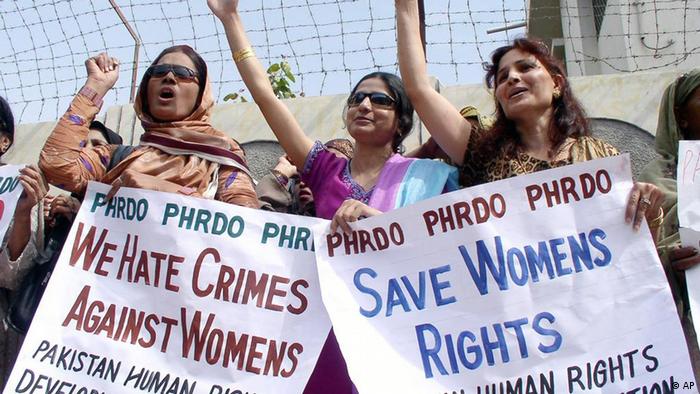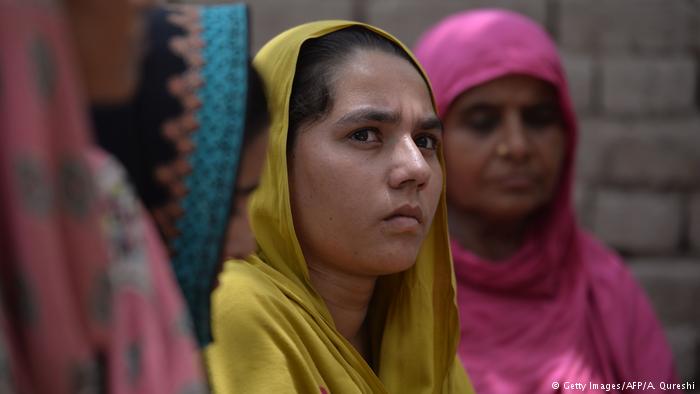Witnesses for a rape
 Attention please: Girls and women of all age groups are requested to keep at least two adult men or four adult women with them, regardless of whether they are at home or elsewhere. This measure will help in case the woman in question is raped. The witnesses can then testify in court and help the victim get justice. Rapists are also requested not to harm these victims so that the Islamic law could be properly executed. If four witnesses are not found, the rapist is requested to arrange them before raping a woman. Remember: Islam gives equivalent rights to women and fulfils all provisions of justice.
Attention please: Girls and women of all age groups are requested to keep at least two adult men or four adult women with them, regardless of whether they are at home or elsewhere. This measure will help in case the woman in question is raped. The witnesses can then testify in court and help the victim get justice. Rapists are also requested not to harm these victims so that the Islamic law could be properly executed. If four witnesses are not found, the rapist is requested to arrange them before raping a woman. Remember: Islam gives equivalent rights to women and fulfils all provisions of justice.
This sarcastic announcement on social media describes the concerns of every single woman in Pakistan after the recent statement given by Pakistan’s Counsel of Islamic Ideology. It reminded me of the cases of Mukhtaran Mai and 18-year-old Razia, typical examples of rape victims who were denied justice. These cases were widely reported and even got international attention.
Mukhtaran Mai was gang raped in Muzzargarh near Multan in 2002 by several men after a decision by the local village body. Poor Razia, a newly married bride from Lodhran was gang raped by five men in the vicinity of the M.A Jinnah mausoleum in Karachi in 2008. Both of these victims failed to get justice as they could not produce four “righteous” adult witnesses who could testify in the court (a requirement to convict the rapist according to Pakistan’s penal code).
In the case of Mukhtaran Mai, no DNA test was carried out on her or the accused following which all the accused were acquitted, except for one who was given a life sentence. In Razia’s case, the arrests were made after positive DNA tests. A court in Karachi recently acquitted the accused in the Razia case with the argument that nobody witnessed the crime and that DNA tests could not be used to convict the accused. The events left me dumbstruck. To add fuel to my frustration, the Counsel of Islamic Ideology (CII) of Pakistan released a statement recently.
The Council said that DNA test results were not acceptable as primary evidence in rape cases. The CII is a judicial body that interprets and provides consultations to law-making institutions as far as the application of Islamic law in Pakistan is concerned. According to the council, DNA evidence should, at best, be considered as circumstantial evidence on the basis of which arrests can be made and further investigations can be carried out. However, a suspect cannot be punished on the basis of DNA evidence alone. For that, the evidence of four righteous male adults is necessary. This seems as though the CII is telling women to take four witnesses along before getting raped. Could it get more bizarre than this?
Unreported Rape Cases
Pakistan is a society where rapes often go unreported. According to a report released by the Awaz Foundation Centre for Development in November last year, 2,713 cases of violence against women were reported in 15 districts of southern Punjab since January 2012. This tells us about the degree of violence against women. The actual number of incidents could, however, be much higher as the stigma of rape, the treatment of such cases by police officials and low prosecution rates keeps women from complaining. A family pressure on the victims to avoid further ‘shame’ is also one of the reasons for not reporting such cases.
The statement by the CII is another blow to survivors who have refused to give in to their transgressor’s social or political influences or to social stigmas. After the statements and the declaration by the Council, women who already feel uncomfortable coming forward and reporting rapes would find it more difficult to place their confidence in the country’s judicial system. I am afraid the decision taken by CII could serve as a major setback even in rape investigations.
“DNA Test not reliable”
In a statement given on media by one member of the CII member Allama Tahir Ashrafi, said that they have doctors in the Council, who say that there is doubt in DNA testing and as the punishment for the crime is very hard, one has to be careful.
The CII’s verdict exposes the folly of the so-called developed world where DNA evidence is a key tool for law enforcement’s investigation and prosecution of a sexual assault case. It is used to prove that a sexual assault occurred and to show that the defendant is the source of biological material left on the victim’s body. I am afraid nobody informed these “noble men” that DNA testing is 98 percent accurate.
Author: Unbreen Fatima
Editor: Manasi Gopalakrishnan






